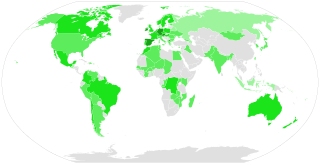Related Research Articles
In politics, a red–green alliance or red–green coalition is an alliance of "red" parties with "green" parties. The alliance is often based on common left political views, especially a shared distrust of corporate or capitalist institutions. While the "red" social-democratic parties tend to focus on the effects of capitalism on the working class, the "green" environmentalist parties tend to focus on the environmental effects of capitalism.

A Green party is a formally organized political party based on the principles of green politics, such as social justice, environmentalism and nonviolence.

The politics of the Netherlands take place within the framework of a parliamentary representative democracy, a constitutional monarchy, and a decentralised unitary state. The Netherlands is described as a consociational state. Dutch politics and governance are characterised by a common striving for broad consensus on important issues, within both of the political community and society as a whole.

Politics in Austria reflects the dynamics of competition among multiple political parties, which led to the formation of a Conservative-Green coalition government for the first time in January 2020, following the snap elections of 29 September 2019, and the election of a former Green Party leader to the presidency in 2016.
GroenLinks is a green political party in the Netherlands. It was formed on 1 March 1989 from the merger of four left-wing parties: the Communist Party of the Netherlands, the Pacifist Socialist Party, the Political Party of Radicals and the Evangelical People's Party, which shared left-wing and progressive ideals and earlier co-operated in Regenboog-coalition for the 1989 European Parliament election.

The Pacifist Socialist Party was a left-wing Dutch socialist political party. The PSP played a small role in Dutch politics. It is one of the predecessors of the GreenLeft.

Adrianus Petrus Wilhelmus "Ad" Melkert is a Dutch politician and diplomat of the Labour Party (PvdA) who has served as a Member of the Council of State since 20 January 2016.

The Communist Party of the Netherlands was a Dutch communist party. The party was founded in 1909 as the Social-Democratic Party (SDP) and merged with the Pacifist Socialist Party, the Political Party of Radicals and the Evangelical People's Party in 1991, forming the centre-left GreenLeft. Members opposed to the merger founded the New Communist Party of the Netherlands.

The New Communist Party of the Netherlands is a communist party in the Netherlands. The NCPN was founded in 1992 by the former members of the Communist Party of the Netherlands to oppose CPN's merger into the centre-left GroenLinks. These members have been known as "the Horizontals". Through the Stichting HOC, the NCPN releases the monthly newspaper Manifest.

The Evangelical People's Party was a minor progressive Protestant political party in the Netherlands. It is one of the predecessor parties of the modern-day GreenLeft.

Erik Meijer is a former Dutch politician who was a member of the European Parliament for the Dutch Socialist Party, part of the European Left, between 1999 and 2009. From July 2014 till June 2015 he was a member of the Dutch Senate.

The Political Party of Radicals was a progressive Christian and green political party in the Netherlands. The PPR played a relatively small role in Dutch politics and merged with other left-wing parties to form GreenLeft in 1991.

The Dutch municipal elections of 2006 were held on March 7, 2006. About 11.8 million people could vote in 419 municipalities. Due to local redistricting, 15 municipalities have already held elections in January 2006 and 24 municipalities will hold elections in November 2006. In some cities, such as Amsterdam, there were two elections, for the municipality and for the 'stadsdeelraden'.
This article gives an overview of socialism in the Netherlands, including communism and social democracy. It is limited to communist, socialist, and social-democratic parties with substantial support, mainly proved by having had a representation in parliament. The sign ⇒ means a reference to another party in that scheme.

The Green Progressive Accord was an alliance of Dutch political parties: Political Party of Radicals (PPR), Pacifist Socialist Party (PSP), Communist Party of the Netherlands (CPN) and Green Party of the Netherlands (GPN).

Johannes Pieter (Jan) Laurier is a Dutch politician. From 2007 to 2011, he was a member of the Senate for GreenLeft.

Ina Brouwer is a retired Dutch politician of the Communist Party of the Netherlands (CPN) and later co-founder of the GreenLeft (GL) party and lawyer.
The issue of the universal basic income gained prominence on the political agenda in Netherlands between the mid-1970s and mid-1990s but it has disappeared from the political agenda over the last fifteen years.
The Green Party of the Netherlands (GPN) was a Dutch political party. It only existed on paper. The goal of the founders was to preempt the formation of another party calling itself "green". Most of the founders were involved in the Political Party of Radicals (PPR), a progressive Christian party, which was allied to green parties in Europe such as ECOLO and German Greens.
References
- ↑ Wet Harrewijn, ORnet.nl.
- The Ab Harrewijn Prize web site.
- Ab Harrewijn-lecture